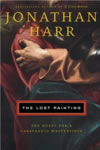The Lost Painting
by Jonathan Harr
This novelistic account of the rediscovery of The Taking Of Christ clothes an unremarkable academic quest in the trappings of genre fiction. Harr's account is vivid, colorful, and full of character and incident. His care to avoid discussing anything his characters did not then know, while it lets us share the thrill of discovery, prevents him from explaining much about the work itself or about the course of its rediscovery.
Early on, for example, the point-of-view characters -- then Italian graduate students -- commit a breach of manners and (probably) of ethics, disclosing confidential information to their thesis advisor and then publishing that information, with their advisor, in a scholarly journal. This seems a remarkable breach, but because the students doubtless didn't immediately understand how serious it was, Harr can't really discuss the episode or its consequences beyond describing the immediate emotional impact.
The novelistic pleasures of description might justify passages that seem more likely to be imagined than remembered. Harr knows about the sunlight on the rooftops, the gestures of the expert academics, and the menu at dinner when it suits the needs of pacing and color. It makes a good story, but the details are often so convenient that they make us distrust the narrator. Does he really know this?
It's merely a matter of style. On the whole, I prefer to take my history straight.
